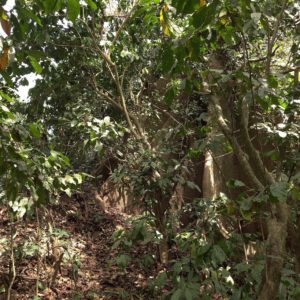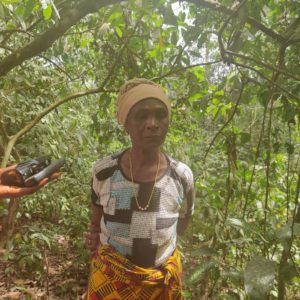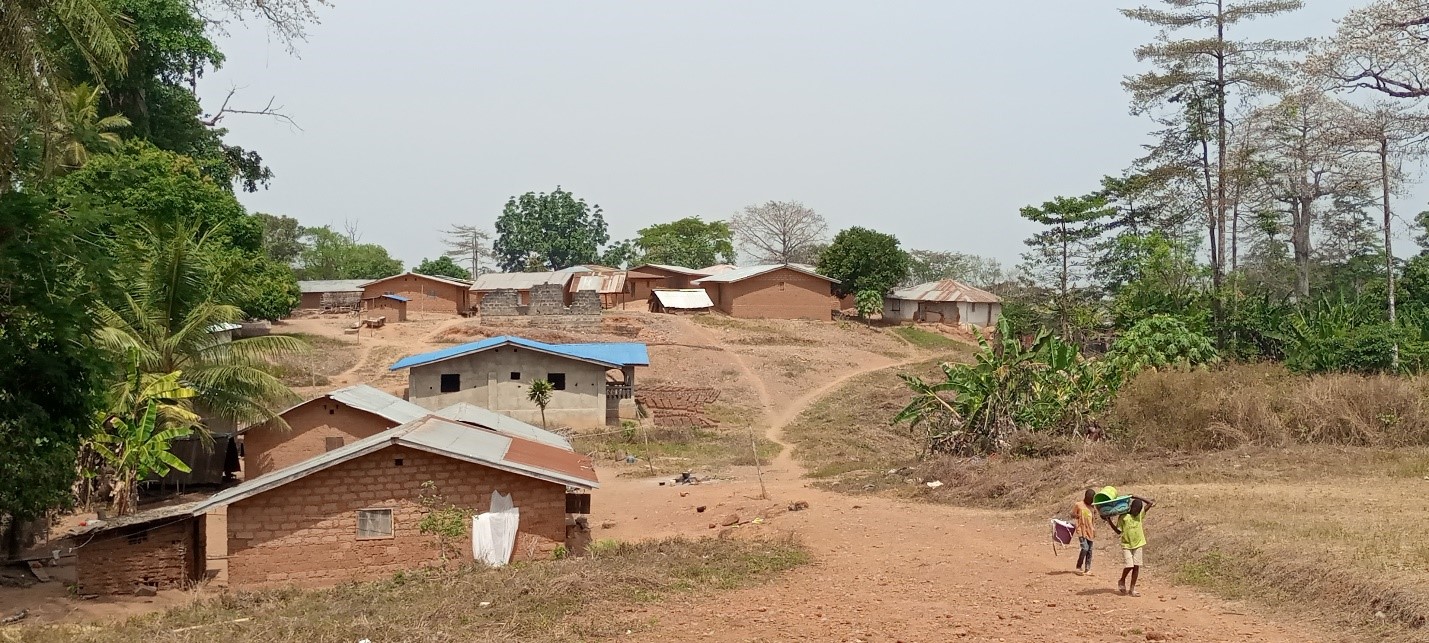PHOTO: Partial view of once NPFL/RUF occupied Kpakamai / News Public Trust/William Selmah
By William Selmah, with New Narratives
LOFA COUNTY, Liberia – At the base of a slope in the outskirt of Kpakamai, lies the shallow grave of Papa Ballah under a giant cotton tree – a man buried alive in 1994 by Revolutionary United Front RUF fighters led by Gibril Massaquoi. Ballah was arrested barely 24 hours following revelation by a soothsayer that an enemy was planted among the fighters.
In an attempt to purge their file, Ballah was singled out as that bad apple and therefore arbitrarily condemned to death by the RUF command.
Gibril Massaquoi was a top commander of Sierra Leone’s Revolutionary United Front rebel army that aided Charles Taylor’s NPFL to recapture territories lost to the rival ULOMO faction in1993/94 and beyond. The former classroom teacher joined RUF during the early days of the civil war in his home country in Sierra Leone and soon rose to its top command, becoming Foday Sankor’s Assistant.
He’s now standing trial in Finland on several counts related to his role in the Liberian conflict and his link to jailed Liberian President Charles Taylor. The specific charges are murder, aggravated rape, war crimes and human rights violations under exceptional circumstances. He has pleaded not guilty to all charges.
According to the TRC Report, crimes committed by the RUF in Liberia amounts to 86 including summary executions, rape, torture, sexual slavery, etc. RUF operations in Liberia were largely centered in Lofa County.
“Two days after they arrested my husband and took him away to Kpakamai, they came for me and said the commander wanted to see me. They took me away and, when we got in the town, they told me that they had brought me to witness my husband’s death,” the widow of the victim who prefers anonymity and not to be photographed, said.
Breaking down intermittently in tears during the interview, he said while being led away, she was taunted, tortured and stroked. Breaking down intermittently in tears during the interview, she recalled how her captives used cigarette fire to burn off portion of her hair, dropping the strings on her shoulder.
“As we dug the hole in which Ballah was buried, we did so with speed and under gunpoint. You could not rest even for a second, and I tell you it was really a sad day,” says Alfred B. Kollie, a Kpakamai citizen now resident in Monrovia.
“On the day Ballah was brought bound by the hands behind, he pleaded with almost everyone he could recognize to come to his rescue, but as he cried and called out for help, everyone he cried out to and called by name including me shied away for fear of being implicated or accused of anything,” Momolu Ballayan, great grandson of Kpakamai’s founding father explained.
“Absolutely no one answered his call to plead on his behalf. You could just imagine what would have happened if anyone attempted, because you found yourself confronted with a group of people that is wicked and unreasonable,” he further narrates.

Villagers say Papa Ballah was buried alive under this cotton tree. News Public Trust/William Selmah
Kollie said though he saw Ballah in custody, he never stayed in the town to witness the unprecedented style of execution of the victim.
The RUF/NPFL marriage in the early 90s which led to RUF forces coming to Liberia, undeniably marked some of the darkest chapters of the country’s civil war; especially for communities under their control such as Kpakamai.
The once peaceful Kpakamai Town, once the clans’ traditional headquarters, was soon turned into a killing field with the coming in of joint RUF/NPFL forces – witnessing some of the worst forms of executions in living memory
“For me, I’m happy that they finished catch some of them. They should really deal with them the way the law says”, Sonnie Garwu, an elderly woman now in her late 70s exclaims, recalling how their tormentors had turned themselves into somewhat half gods at the expense of their fast eroding human dignity during the civil war.
She remembers moments when women and girls – some far too young, were called to go into gatherings of fighters with their own mats which they used to sexually abuse them, with each fighter taking their turns on them (women and girls). Using them as sex objects in such manner would last up to a week at times, Sonnie narrates.

Madam Sonnie Garwu. PHOTO: William Selmah/News Public Trust
She has got her own story too, though dissimilar to that of others. “I was beaten and they naked me and searched for money in my underpants. The guys who did this came from Sierra Leone. They were here along with government forces. They also naked and raped women in this town. I could not understand what I was seeing.”
The tales of atrocities committed in Kpakamai are striking and numerous and they differ from one individual to the other. The tears rolling down cheeks during interviews that though the days of carnage are over, the psychological wounds created remain ever fresh on the minds of victims.
“They asked me to say my last words to him. I said to him: Papa, please do not come for me when you go. This is happening to you because of war. He answered and said they are killing me for something I did not do. This is their will,” the widow again loses emotion in tears.
“The town was very sad that day. I mean very, very said. To bury someone alive? We had never seen that anywhere before”, Kollie recalls. These people really need to bear the consequences of their actions and it is good that it is starting with Massaquoi,” he stressed.
“I know I can’t get my husband back again, but punishing the people that treated him that kind of way, that you can’t even treat an animal, is a good thing. Papa can’t come back to life again, but let the case go all the way to the end; it shouldn’t stop half way. People will start learning some lesson, Ballah’s widow said in a rather emotional interview.
She was pregnant with her second child when her husband was arrested and gruesomely killed.
“I never thought this day was ever going to come, for some of these people like Massaquoi to be under arrest and taken to court”, the wife of the late Ballah said. Prosecutors are demanding a life sentence for Massaquoi.
Ballah’s extrajudicial killing is just a tiny percentage of the numerous atrocities committed in Kpakamai under NPFL/RUF occupation. The people here speak of scores of other upsetting crimes.
They naked me before the gathering and made me to drink peepee (urine). I stood naked before the entire town including women in this town, and that was the main thing that really hurt me; not the peepee I drank because I knew it was not going kill me by the grace of God, Town Chief Akoi Esieh tells his story. He said he knew there would have been a day of reckoning whether in this life or the life now or the life after.
“That is how you see one of their big men now arrested. All of us that suffer in their hands. Part of their punishment should be making them to drink another person’s peeepe too,” Esieh lamented.
Though Sierra Leonean RUF troops dominated their counterparts of the NPFL, the name Gibril Massaquoi does not resonate much with the people here but one of his subordinates (Pap James) who is deceased. However, Massaquoi’s war time name (Angel Gabriel) would click with a few. This is probably because as the investigation gathered, Massaquoi was often in and out, compared to Pap James who was stationed in the town and was even buried there after being shot and killed in battle.
“We whole heartedly welcome efforts underway by the Finnish Government to prosecute an alleged war crimes perpetrator. But quite frankly, the name ‘Gibril Massaquoi’ was never a household name during the civil war in Liberia,” the Secretary General of the Civil Society Advocacy Platform Adama Dempster notes.
“I have read through the TRC report, seen the names of mercenaries that fought here during the civil war, run through the list of most notorious perpetrators, but never quite frankly saw the name Gibril Massaquoi mentioned anywhere. Probably his is among the undocumented cases because there are several of them in that category.”
Dempster who is also a staunch advocate for a war crimes court for Liberia to prosecute and to punish wartime perpetrators however said they look forward to a fair trial. “If he is convicted based on evidence that will be adduced in court, it can only further give impetus to our work as advocates in ensuring that war criminals are brought to justice.
If this trial proceeds and is brought to logical conclusion, it will be a clear sign that a war crimes tribunal for Liberia is a certainty,” Dempster emphatically said.
This story was a Public Trust Media Group– www.newspublictrust.com In collaboration with New Narratives as part of our Africa Justice Reporting Project. Funding is provided by the American World Jewish Service. The funder had no say in the story’s content.

